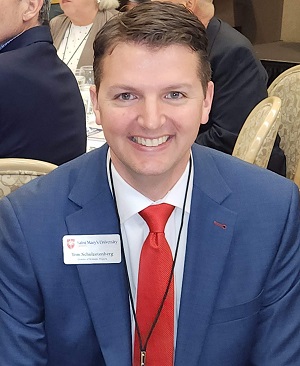Philanthropy, or as the Catholic Church calls it, charity, is an ancient practice, said Tom Schulzetenberg, director of strategic projects at St. Mary’s University of Minnesota in Minneapolis. However, the Church’s stance on philanthropy differs from the modern perspective of philanthropy, Schulzetenberg said.
Giving ourselves to the Church and others is a good deed that God wishes us to commit to, Schulzetenberg told “Practicing Catholic” host Patrick Conley in a program set to air at 9 p.m. April 4 on Relevant Radio 1330 AM. Modern philanthropy, on the other hand, Schulzetenberg argued, is often giving directly from the self to others not as individuals, but as a mass. This view of philanthropy not only removes God but also substitutes the individual for the masses.

“As we’ve seen, oftentimes this disorder opens the door to ego. ‘I am the benefactor who directs the good’ and how this can really drive social change,” Schulzetenberg said. “The impetus here is power and self-aggrandizement and not really salvation and going to heaven. This oftentimes tends to look at data-driven impact and scientific results. It’s about finding the cure, not so much about treating the symptoms. It’s not so much about the poor people themselves; it’s about curing poverty. And so, it’s a very different notion.”
Everything in our lives is a gift from God, Schulzetenberg said.
“Once we start to understand and really imbue this idea that all is a gift, it imbues a sense of gratitude for everything I have,” Schulzetenberg said. “Everything is a gift from God, and the idea here is one of stewardship and not of possession. I take care of the gifts that God has entrusted to me, and I trust that he will always provide for me, rather than, ‘I must take everything and possess it and keep it and only dispense what I think is going to be good for others.’”
Schulzetenberg also explained that God gives abundantly, even giving us more than we need. This notion that God gives more than we need, Schulzetenberg said, turns the zero-sum game on its head. He mentioned that the law of economics suggests, “If I have something and I give it to you, I don’t have it.”
“The Catholic notion is there’s always more than what we need because God gives everything,” Schulzetenberg said. “We emulate the Father in giving all that we possibly can without regard to how it affects us. It’s a powerful idea that not only do I give because God gives to me, but I give in a way (that) the Father gives, either through grace, the sacraments or my financial possessions.”
To hear Schulzetenberg explore the differences between Catholic and secular philanthropy, tune into “Practicing Catholic,” which repeats at 1 p.m. April 5 and 2 p.m. April 6.
As part of the program, Deacon Art Miller from St. Mary in Simsbury Connecticut, shares the theme of being pilgrims of hope by walking through life trusting in God. Also, Kate Soucheray, a columnist with The Catholic Spirit, explores the ways in which the Holy Spirit moves within people, guiding decisions and shaping actions.
Produced by Relevant Radio and the Archdiocese of St. Paul and Minneapolis, “Practicing Catholic” can be heard after it has aired at archspm.org/faith-and-discipleship/practicing-catholic or choose a streaming platform at Spotify for Podcasters.




